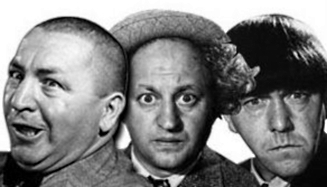|
Listen to this post:
|
 Thanks to reader Mike K. for this hilarious link. They beat me to the punch – I’ve been sitting on a post for some time on this exact theme. (Stay tuned.)
Thanks to reader Mike K. for this hilarious link. They beat me to the punch – I’ve been sitting on a post for some time on this exact theme. (Stay tuned.)
I posted a comment asking about this bit:
It’s interesting to note that the English term “Trinitarian” was first used, in the 16th and 17th centuries, as a pejorative description of anti-trinitarians; the heretics were dubbed “Trinitarians”! Then, by the early 18th century, anti-trinitarianism had become so pervasive that orthodox writers were now described as “Trinitarians.”
Is the first part of that true? (I’ve not run across it… but I’ve not read all that much 16th c. stuff relating to the Trinity.) Any trinities readers know?

Thanks, guys – just posted on what the OED says. May post again if I get my hands on that 17th c. source.
Pingback: trinities - Heretical “trinitarians” - evolution of a word (Dale)
I’ve run across it once or twice; I didn’t realize it was a general thing.
On the subject of Trinitarian humor, have you seen the most recent xkcd?
Hi Dale. Sorry, your comment at my blog disappeared due to problems with Blogger. And I tried posting a reply, but that vanished too! So anyway, here’s my quick reply:
I’ve come across this early use of the term in my own reading of primary texts from the 16th and 17th centuries. But there’s also a good entry on this in the OED, under “Trinitarian” (you’ll need to consult the full version, not the Shorter Oxford). The OED traces the history of the word’s use, with examples from the 16th and 17th centuries (where “Trinitarians” are heretics), and from the early 18th century (where the orthodox become the “Trinitarians”).
Hope that helps!
Interesting you asked about the pejorative label; I know I’ve heard of it before, and it is peculiar if true.
Nonetheless, perhaps, Ben Myers and you can advance this 5-year ban for precisely the motivation advanced by Ben:
…the use of the word “trinitarian” in much contemporary theology – as a generic slogan, applied willy-nilly on any occasion – has become an obstacle to real theological thinking.
Comments are closed.